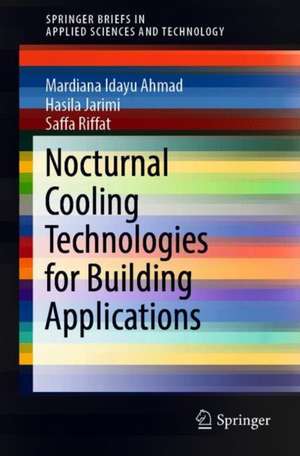Nocturnal Cooling Technology for Building Applications: SpringerBriefs in Applied Sciences and Technology
Autor Mardiana Idayu Ahmad, Hasila Jarimi, Saffa Riffaten Limba Engleză Paperback – 8 apr 2019
Din seria SpringerBriefs in Applied Sciences and Technology
-
 Preț: 380.29 lei
Preț: 380.29 lei - 17%
 Preț: 360.33 lei
Preț: 360.33 lei - 20%
 Preț: 386.11 lei
Preț: 386.11 lei -
 Preț: 380.07 lei
Preț: 380.07 lei -
 Preț: 377.95 lei
Preț: 377.95 lei -
 Preț: 382.32 lei
Preț: 382.32 lei -
 Preț: 376.59 lei
Preț: 376.59 lei -
 Preț: 379.09 lei
Preț: 379.09 lei -
 Preț: 378.12 lei
Preț: 378.12 lei - 20%
 Preț: 293.83 lei
Preț: 293.83 lei -
 Preț: 344.90 lei
Preț: 344.90 lei -
 Preț: 321.35 lei
Preț: 321.35 lei -
 Preț: 264.79 lei
Preț: 264.79 lei -
 Preț: 344.90 lei
Preț: 344.90 lei -
 Preț: 356.45 lei
Preț: 356.45 lei -
 Preț: 382.95 lei
Preț: 382.95 lei -
 Preț: 355.65 lei
Preț: 355.65 lei -
 Preț: 479.67 lei
Preț: 479.67 lei -
 Preț: 415.18 lei
Preț: 415.18 lei -
 Preț: 444.52 lei
Preț: 444.52 lei - 20%
 Preț: 301.85 lei
Preț: 301.85 lei -
 Preț: 409.43 lei
Preț: 409.43 lei - 20%
 Preț: 322.17 lei
Preț: 322.17 lei -
 Preț: 355.48 lei
Preț: 355.48 lei - 15%
 Preț: 462.51 lei
Preț: 462.51 lei -
 Preț: 377.18 lei
Preț: 377.18 lei -
 Preț: 355.92 lei
Preț: 355.92 lei -
 Preț: 382.95 lei
Preț: 382.95 lei -
 Preț: 378.12 lei
Preț: 378.12 lei -
 Preț: 378.12 lei
Preț: 378.12 lei -
 Preț: 380.07 lei
Preț: 380.07 lei -
 Preț: 380.07 lei
Preț: 380.07 lei - 20%
 Preț: 326.28 lei
Preț: 326.28 lei -
 Preț: 312.68 lei
Preț: 312.68 lei -
 Preț: 356.42 lei
Preț: 356.42 lei -
 Preț: 412.30 lei
Preț: 412.30 lei - 20%
 Preț: 225.31 lei
Preț: 225.31 lei -
 Preț: 378.12 lei
Preț: 378.12 lei -
 Preț: 376.59 lei
Preț: 376.59 lei -
 Preț: 195.87 lei
Preț: 195.87 lei -
 Preț: 376.22 lei
Preț: 376.22 lei - 20%
 Preț: 324.64 lei
Preț: 324.64 lei - 20%
 Preț: 288.73 lei
Preț: 288.73 lei -
 Preț: 377.57 lei
Preț: 377.57 lei -
 Preț: 261.91 lei
Preț: 261.91 lei -
 Preț: 381.98 lei
Preț: 381.98 lei -
 Preț: 273.63 lei
Preț: 273.63 lei -
 Preț: 410.85 lei
Preț: 410.85 lei -
 Preț: 379.68 lei
Preț: 379.68 lei -
 Preț: 374.30 lei
Preț: 374.30 lei
Preț: 375.84 lei
Nou
Puncte Express: 564
Preț estimativ în valută:
71.92€ • 74.60$ • 59.97£
71.92€ • 74.60$ • 59.97£
Carte tipărită la comandă
Livrare economică 27 martie-10 aprilie
Preluare comenzi: 021 569.72.76
Specificații
ISBN-13: 9789811358340
ISBN-10: 9811358346
Pagini: 56
Ilustrații: IX, 70 p. 7 illus., 5 illus. in color.
Dimensiuni: 155 x 235 mm
Greutate: 0.13 kg
Ediția:1st ed. 2019
Editura: Springer Nature Singapore
Colecția Springer
Seria SpringerBriefs in Applied Sciences and Technology
Locul publicării:Singapore, Singapore
ISBN-10: 9811358346
Pagini: 56
Ilustrații: IX, 70 p. 7 illus., 5 illus. in color.
Dimensiuni: 155 x 235 mm
Greutate: 0.13 kg
Ediția:1st ed. 2019
Editura: Springer Nature Singapore
Colecția Springer
Seria SpringerBriefs in Applied Sciences and Technology
Locul publicării:Singapore, Singapore
Cuprins
Introduction.- Definition, Concepts and Principles.-Materials and Devices.- Cooling System and Configuration.- Performance Studies: The State-of-The-Art.- Potential of nocturnal cooling in various locations/countries and climatic conditions.- Conclusions.
Notă biografică
Mardiana Idayu Ahmad obtained her Ph.D. in Engineering Science: Sustainable Energy Technologies at the Department of Architecture and Built Environment, Faculty of Engineering, University of Nottingham United Kingdom in 2011. She is currently Associate Professor in the Environmental Technology Division, School of Industrial Technology, Universiti Sains Malaysia. Her research spans in the breadth of sustainable energy technologies and environmental management. She has always been passionate about continuing her research in a way to bridge these two fields. Her research work leads to the production of over than 100 publications nationally and internationally, including journal papers, research books, popular academic books, book chapters, conference proceedings, and other publications.
Hasila Jarimi obtained her BSc in Physics from the University Manchester, United Kingdom in 2008 and Ph.D in Applied Sciences specialising in Solar Energy Technology,at Universiti Teknologi Mara (UiTM) Perlis, Malaysia in 2016. As a passionate Physicist, she is always interested to see how Physics is connected with the real world. Her deep interest in Renewable Energy has been her main motivation in applying Physics in the study of renewable energy. She is currently a postdoctoral research fellow at the Department of Architecture and Built Environment, Faculty of Engineering, University of Nottingham United Kingdom.
Professor Riffat is one of the world’s leading experts in sustainable technologies/eco-buildings He holds the posts of Chair of Sustainable Energy and Head of Architecture, Climate and Environment Research Group at the University of Nottingham, UK. He is is also the President of the World Society of Sustainable Energy (WSSET). He has a wide range of experience of renewable energy/sustainable technologies, eco-cities/sustainable buildings, heat pumps/ cooling systems, energy storage and heat powered power cycles. He has published over 650 refereed papers. He has been awarded the degree of Doctor of Science (DSc) from the University of Oxford for his research contribution in the field of heat pumps and ventilation technology. He is named as the inventor on 30 International Patents.
Caracteristici
Presents detailed information on nocturnal cooling technologies for building applications Discusses how nocturnal cooling is more promising than diurnal cooling Highlights how (future) buildings can be energy efficient and sustainable
